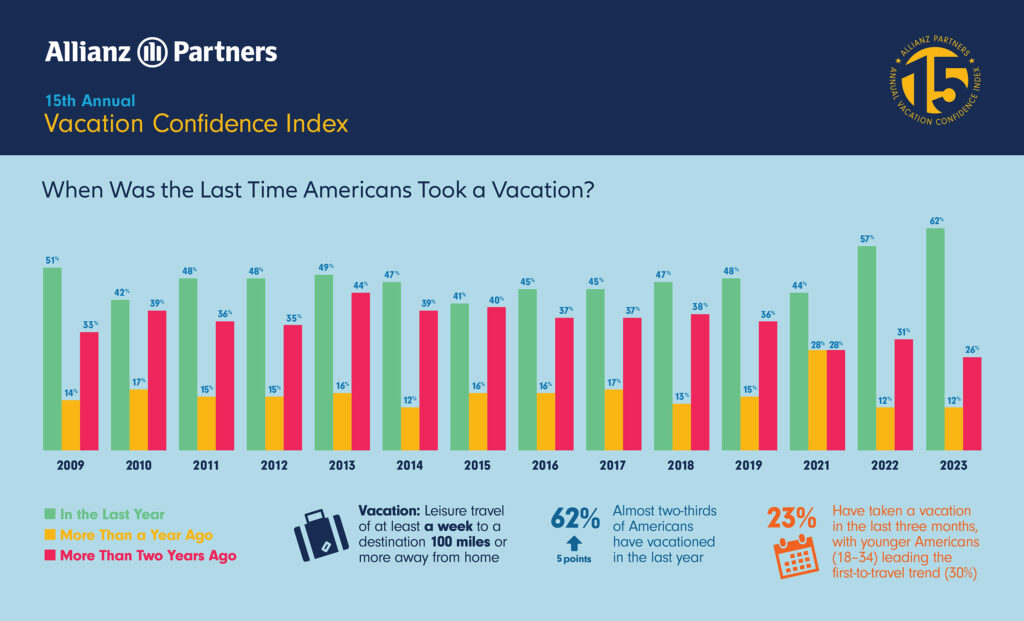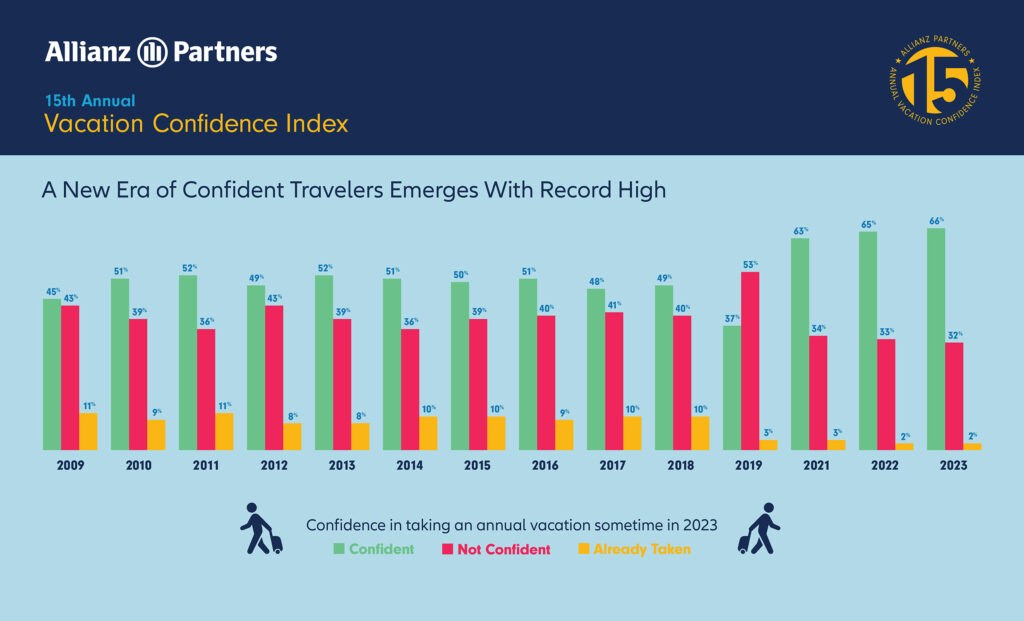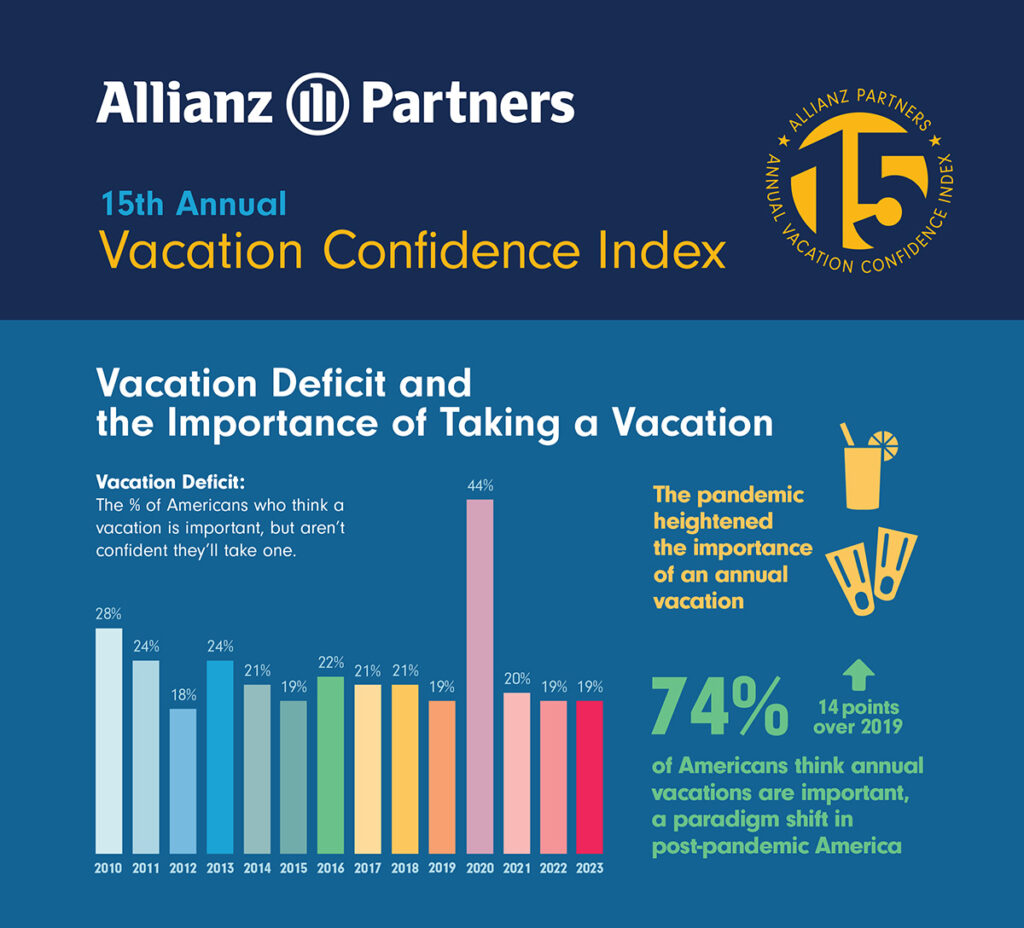Americans are ready, willing and confident they will travel this year. The 15th annual Allianz Partners USA’s Vacation Confidence Index* underscores the paradigm shift that started during the pandemic around the importance of taking an annual vacation, as Americans continue to prioritize leisure travel time and more have already taken a vacation this year than any other time during the survey’s history.
According to the travel insurance and assistance’s company’s latest survey, almost two-thirds (62%) of Americans have taken a vacation in the last year, a five-point increase from last year and up from 48% in pre-pandemic 2019.
With Americans eager to flex their travel muscles, a quarter of respondents (25%) said they are revenge traveling and two in five (41%) of Americans cited excess savings earmarked for travel, a figure which rises to half (51%) for higher income households of $100,000 or more, noting that both overall figures represent statistical declines year over year.
Many Americans made good on making up for any lost travel time, as 23% noted they already took a vacation in the three months leading up to this year’s survey, the second highest point since the survey started in 2009. With these first-to-travel indicators tracking slightly higher from last year, the 18-34 year-old demographic continues to take the lead position: 30% of this age set have already taken a vacation this year, versus 21% of 35-54 year-olds and 19% of 55 year-olds.

With a newfound importance placed on vacations since the pandemic, the Vacation Confidence Index reveals the stated importance (74%) of an annual vacation is higher and the confidence (66%) or positive intentions to vacation this year is higher and continuing to track well above what was observed prior to the pandemic, both record highs that signal the start of a new shift in attitudinal behavior towards vacation.
Who is feeling the most confident about vacationing? The under 55 cohort continues as more likely to express confidence with 72% of 18–34-year-olds and 68% of 35–54-year-olds compared to 59% of those 55+, and those who make upwards of $100,000 in household income (79%) versus $50,000-$100,000 (65%) and under $50,000 (52%) income households.

While Americans are emphatically citing the importance of annual vacations, two in five (19%) are not confident that they’ll take one this year, a percentage Allianz Partners USA has defined as the “vacation deficit.” This figure is on par with the past few years, with the exception of the height of the pandemic in 2020, when the vacation deficit rose to 44% of Americans who felt vacations were important, but were not confident they would take one. Given that more Americans are back to travelling since the pandemic and they’re buoyed by strong vacation intentions, it’s not surprising that the vacation deficit is within striking distance of the all-time low of 18% in 2012.

“Americans are ranking a vacation as a top priority in 2023, and we’re seeing record-breaking sentiment around vacation importance and confidence in taking an annual vacation,” said Daniel Durazo, director of external communications at Allianz Partners USA. “With an elevated number of travelers, the possibility of a travel delay looms, which some travelers have already experienced this year. “One way to successfully navigate that type of unexpected mishap is to invest in a travel insurance policy, which can really save the day by reimbursing costs for a covered delay.”
The Vacation Confidence Index has been conducted each summer since 2009 by national polling firm Ipsos Public Affairs on behalf of Allianz Partners USA.
Allianz Partners offers travel insurance through most major U.S. airlines, leading travel agents, online travel agencies, hotel companies, cruise lines and directly to consumers.

